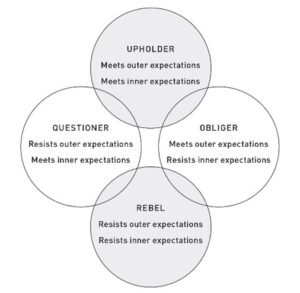Gretchen Rubin’s Four Tendencies
Gretchen Rubin is one of my go-to life hack gurus. She’s written five books examining habits and human nature. The most well-known one is The Happiness Project. Over the space of 12 months she examined 12 areas of her life including work, family, pleasure and fitness and figured out ways she could make herself happier in each.
She followed this up with Happier At Home and Better Than Before. But my favorite is her fourth self-help book, The Four Tendencies. The Tendencies are described as ‘the indispensable personality profiles that reveal how to make your life better (and other people’s lives better, too)’.
Gretchen Rubin's Four Tendencies
The Four Tendencies
As part of her ongoing investigations into understanding human nature, Gretchen Rubin realised that by asking, ‘how do I respond to expectations?’ we gain an additional layer of self understanding.
One of the inspirations for writing the book was the number of questions she received from people asking how she quit sugar so easily.
In 2012 Gretchen stopped eating sugar and once she’d decided she stuck to it (you might not know, but sugar is more addictive than cocaine so it’s no wonder so many of us struggle to eradicate it from my lives!).
What made Gretchen different?
This was the question she asked herself and which led her to research on why some people find making life changes easier than others.
What she discovered is that all of us fall into one of Four Tendences – Upholders, Obligers, Questioners and Rebels.
The Four Tendencies
As part of her ongoing investigations into understanding human nature, Gretchen Rubin realised that by asking, ‘how do I respond to expectations?’ we gain an additional layer of self understanding.
One of the inspirations behind the book was the number of questions from people asking how she quit sugar so easily.
In 2012 Gretchen stopped eating sugar and once she’d decided she stuck to it (you might not know, but sugar is more addictive than cocaine so it’s no wonder so many of us struggle to eradicate it from my lives!).
What made Gretchen different?
This was the question she asked herself and which led her to research why some people find making life changes easier than others.
What she discovered is that all of us fall into one of Four Tendences – Upholders, Obligers, Questioners and Rebels.
Why does it matter?
Have you ever wondered why you can never keep New Year’s resolutions? Or can you keep resolutions and wonder why others find it so difficult?
This was something that perplexed Gretchen Rubin until, as she says, she had a Eureka moment and understood that the simple, decisive question was, ‘how do you respond to expectations?’
Inner Expectations and Outer Expectations
Rubin’s research uncovered that it’s how we respond to the expectations we set ourselves, and the expectations others set for us that determine how we navigate the world.
You can see from the diagram below that everybody sits somewhere between two tendencies, but for the purposes of this article, I’m sticking with the absolute tendencies.

These Four Tendencies are with us from birth, they’re not something we learn and are not dependent on any kind of parenting style or upbringing. Surprisingly, they are not connected to whether you are an introvert or an extrovert.
Why it’s helpful to know your Tendency
I am a very contradictory person and it serves nobody, least of all myself! If Gretchen could help explain why I make life so hard for myself, then this was the book for me! She did not disappoint.
The Four Tendencies helped me understand how to manage and get the best results from myself.
It’s important to know there is no best or worse tendency. There are happy and healthy people in all of them.
Knowing your tendency is the key to unlocking the best way for you to write your book. Use the knowledge to ensure you can be your best self and increase your chances of success.
The four tendencies quiz
If you want to know what your Tendency is, you need to take the quiz! Click below to do the quiz.
The Four Tendencies
Let’s take a brief look at each of the Four Tendencies and how you can apply them to your writing life.
The First Tendency – Upholder
Meets Outer Expectation, Meets Inner Expectations
Gretchin Rubin is an Upholder, and that’s why she found it so easy to quit sugar!
Upholders tend to be self-directed, they meet deadlines with no problem, keep appointments, and manage tasks unsupervised. They don’t depend on reminders.
Being able to meet the expectations of others and of themselves is very freeing for Upholders because they know they will achieve any target set.
Upholders Who Write
If you’re an Upholder you are at an advantage. Not only will you get yourself going, but you will meet any deadline you or your agent set you.
If you’ve promised to have the first draft in by a certain date, that draft will be ready.
The struggle you might have as an upholder is patience with others. If your editor doesn’t get your draft with revisions back to you on the expected date, if your book cover isn’t ready by the time you want to publish for or your book formatted hasn’t met their deadline, the result might be a difficult relationship.
The Second Tendency – Questioner
Resists Outer Expectations, Meets Inner Expectations
Once a Questioner decides on something they will follow through with little difficulty. They have the self-direction of Upholders.
Questioners are committed to information, logic, and efficiency. If you’re a Questioner, you will gather the facts, make a decision based on those facts, and act accordingly.
If somebody asks you to do something, you will want a logical reason why you must comply. If it makes sense to you, you will internalize that expectation and act upon it.
The downside to being a Questioner is that you can take the questioning too far! It becomes exhausting.
Also, if you don’t like the answer to the question, you might refuse to follow through on the instruction or request. That can cause conflict, both at home and at work.
Questioners Who Write
Questioners may get caught down the research rabbit hole. You’ll spend so much time trying to understand every aspect of your fictional world that you never get round to doing the actual writing.
However, once you’ve decided to write, you’ll write the manuscript promptly.
A potential solution to never-ending research is for Questioners to set themselves a deadline.
It’s useful to have an accountability buddy because a Questioner working alone may become, as Rubin writes, frozen with indecision!

From time to time, I link to products or services I love using with affiliate links. This means that I may receive a small percentage or fee for referring you to any product you may purchase from one of those sites. It does not cost you anything. These small fees help sustain my small business. I truly appreciate your support.
The Third Tendency – Obligor
Meets Outer Expectations, Resists Inner Expectations
You probably know if you are an Obligor. You are the person who can never put your needs first.
Obligers are the biggest group of the Four Tendencies, and the ones that people count on the most.
If you’re an Obligor you’re good at meeting deadlines, you volunteer to help other people, and will turn up to help a friend in the middle of the night.
Obligers get along most easily with the other three tendencies.
There is the danger that an Obligor will burn themselves out in their desire to meet the expectations of the world. Letting somebody down is simply not acceptable.
Obligors Who Write
Obligers work incredibly well with an accountability partner. Whether that be another writer or a writing coach.
A word of warning. If that partner doesn’t hold you accountable, or is unreliable themselves, you will fall short.
A way around this is to be part of an accountability group so that if one partner falls short, there’s somebody else they are to pick up the slack.
This is where a paid for editor or book coach will be worth their weight in gold.
The Fourth Tendency – Rebel
Resists Outer Expectation, Resists Inner Expectations
Rebels what they do what, when they want, how they want.
As a Rebel your natural inclination is to resist if someone else tells you what to do.
Rebels are the smallest group. I’m a Rebel, and we often lack self-control and take pleasure in going against convention. You love to confound people’s expectations of you.
Rebels value authenticity and honesty. We like to establish our own ways of doing things and once we have we will do it enthusiastically.
Rebels Who Write
Rebels write what they want, as much as they want and when they want.
However, once we’ve made the decision to write the book, it will get done. It’s just that the decision making process isn’t a smooth one!
This might become difficult once you have an editor and a deadline, because you don’t want to adhere to the rules. But, by reframing our appraoch to a deadline we can achieve great things.
For example, rather than think an editor is trying to tell you what to do, know that you have the choice to finish the book or not. What do you want?
Alternatively, you could make a bet with yourself that you’ll never get your book finished on time. Your response? Don’t tell me I won’t finish my book, I’ll show you!
Conclusion
Gretchen Rubin concluded that “the happiest and most successful people are those who have figured out the ways to exploit their tendency to their benefit and, just as important, found ways to counterbalance its limitations.”
Figure out how to exploit your tendency to your benefit and you’ll go a long way with a successful writing career.
If you want to read about the Four Tendencies in more detail, you can do so HERE.
Don’t forget to take the quiz, which you can do HERE.
If this article was useful, you’ll love:
If you’ve been working on your novel for years (perhaps even decades) the maybe it's time to consider working with a coach.
If you have multiple versions of your novel and you don’t know which works best, are scared nobody will like your book and don't feel like a 'real' writer, then my guess is coaching is the right next step for you.
Find out more and sign up for your free Clarity Call here: https://emmadhesi.com/personal-coaching/

Emma Dhesi writes women’s fiction. She began writing seriously while a stay at home mum with 3 pre-school children.
By changing her mindset, being consistent and developing confidence, Emma has gone from having a collection of handwritten notes to a fully written, edited and published novel.
Having experienced first-hand how writing changes lives, Emma now helps beginner writers find the time and confidence to write their first novel.





